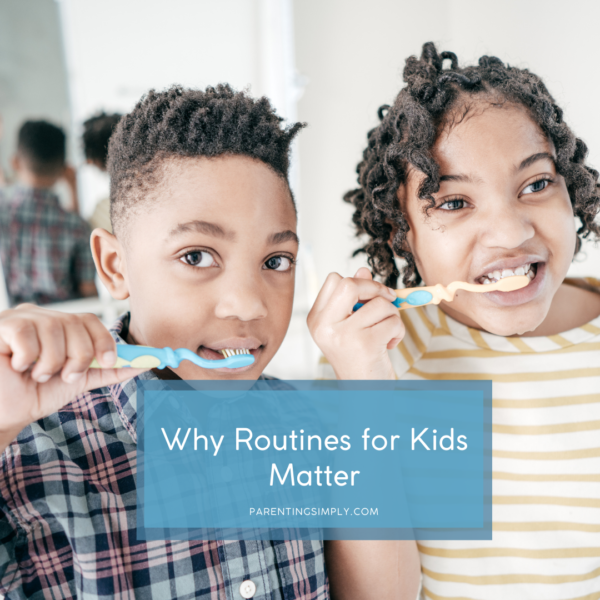
This pandemic is dragging on and on. It has been tough for many reasons, but the lack of a normal routine is one of the most challenging aspects, especially for parents of young children. Why? Because children thrive on predictability and routine and so do parents. When children know what is expected of them and when, they have a much easier time paying attention and listening, and are much more likely to cooperate. Conversely, when children do not know what to expect, they are most inclined to be argumentative and oppositional. They are more likely to have meltdowns and tantrums. Healthy routines for kids are a powerful way to teach self-discipline and create a peaceful home.
So obviously, I am a big believer in the power of routine. Here are 7 benefits to routines and simple ways to develop a schedule that works for your family:
Routines help kids develop healthy habits
Children who come from a chaotic home, where they can never find their backpack, shoes, or pens and paper, obviously, will have a harder time developing good organizational skills. They often don’t develop good self-care habits, like simple personal hygiene, brushing teeth, or combing their hair. It is difficult to develop good habits and discipline when there is a lack of structure. This can affect academics as well. Children who are not given the time or the space in which to do their homework have trouble learning how to accomplish expected school-related tasks.
Routines help you stick to your rules
When children know what to expect there is less fighting about the limits that need to be imposed on children. As I have mentioned in many other articles, children need limits; it helps them feel safe and secure. So, for example, when bedtime is followed consistently there will be fewer fights about bedtime. The rules are built into the natural schedule of your home.
Routines help avoid power struggles
Routines can also limit the amount of arguing that might go on between parents and kids. Instead of you nagging your kids to do what they need to do, the routine speaks for you. Dinner time, computer time, and bedtime become rote, this is the activity that we
do at this time of day. If you are using a picture chart, you can just point to what comes next, i.e. bath time, or what the child is expected to do, i.e. get into pajamas. The silent prompting is appreciated by all. Kids don’t like to listen to your endless requests and you save your energy and voice.
Children become responsible for themselves
After a while children who have had a routine in place will learn to do for themselves. They will organize their own backpacks, set their own alarm, and maybe even pack their own lunches. Most children like the fact that they can take care of their basic needs. It helps them feel competent and confident.
Routines help parents and children bond
When families have routines in place there is less time managing chaos and more time for relaxation. Bonding can be made a part of the routine. We always staggered bedtime so that our kids had “private time” with either my husband or me. We cuddled, read books, talked about our day or played quiet games. We all enjoyed that special time.
Get your kids involved: It is helpful if we create routine charts with our children and focus on what works best for both of you. You can explain to them that having a set schedule for all the things they need to do will ensure that they are less stressed and not always rushing. Depending on the child’s age, a written or picture chart can be used.
Give yourself a break
There are times when rules are made to be broken. When you are sick, your child is sick, there’s a new baby in the house, or you moved into a new home, it is best if you can stick to your routine. However, it is highly unlikely that you will be able to do so. You are probably not going to have the energy to enforce bedtime, computer time, or make sure your children are eating healthy. The fact is vacations and holidays are more fun for kids because the rules are more relaxed. You can still try to stick to a bedtime, (everyone is happier when they get enough sleep), but you are well within the bounds of good parenting to make bedtime a lot later than normal.
Glasser, J., Nadeu, K. (2014). Learning to Feel Good and Stay Cool. Magination Press.
Washington D.C.
Want to learn more?
